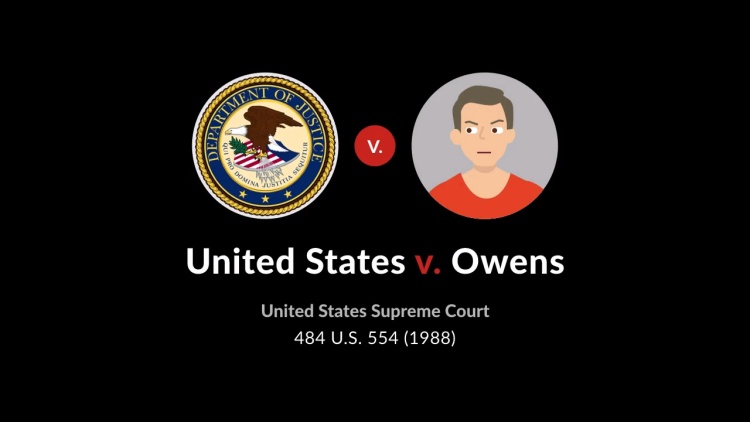United States v. Owens
United States Supreme Court
484 U.S. 554 (1988)

- Written by Richard Lavigne, JD
Facts
Owens (defendant) was charged with attempted murder in relation to the assault of a correctional counselor at a federal prison. The counselor suffered a skull fracture and was hospitalized for nearly a month. An FBI agent visited the counselor in the hospital a week after the assault and found that the counselor could not remember the name of his attacker. After a couple of weeks, the counselor was able to remember the circumstances of the attack and identified Owens from a photographic array. At trial, the counselor admitted that he could not remember having seen his attacker. Although the counselor had been visited by several people while in the hospital, the only visitor he could remember was the FBI agent. He could not remember whether any visitor might have suggested that Owens was the attacker. Owens tried to refresh the counselor’s memory using hospital records indicating that he had identified someone else as the attacker, but the counselor could not remember having made a different identification. Owens was convicted. The court of appeals reversed his conviction because it concluded that the counselor’s testimony lacked sufficient indicia of reliability and should not have been admitted into evidence. The United States (plaintiff) petitioned the Supreme Court for review.
Rule of Law
Issue
Holding and Reasoning (Scalia, J.)
Dissent (Brennan, J.)
What to do next…
Here's why 907,000 law students have relied on our case briefs:
- Written by law professors and practitioners, not other law students. 47,100 briefs, keyed to 996 casebooks. Top-notch customer support.
- The right amount of information, includes the facts, issues, rule of law, holding and reasoning, and any concurrences and dissents.
- Access in your classes, works on your mobile and tablet. Massive library of related video lessons and high quality multiple-choice questions.
- Easy to use, uniform format for every case brief. Written in plain English, not in legalese. Our briefs summarize and simplify; they don’t just repeat the court’s language.





